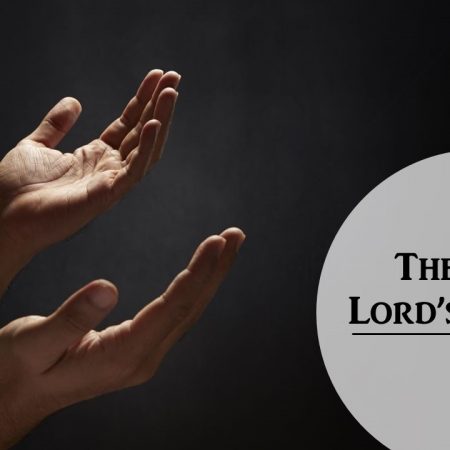
“And now, Father, glorify me in your own presence with the glory that I had with you before the world existed.”
We have seen what glorify means; it means to pour and heap honour and praise. So Jesus is praying that the Father would pour and heap honour and praise on him. Now were that request to be made by anyone other than Christ himself it would be an example of breathtaking arrogance, presumption and even blasphemy.
In these 5 verses in which Jesus prays for himself, he prays two requests; everything else is a reason for or the basis of his requests.
The first request is, as we saw, in verse 1 – “glorify your Son”. We saw that in praying that prayer Jesus is anticipating the cross and Calvary. He is praying for the horrors of Calvary to be poured out on him; for all the unspeakable horrors that he is to experience within a few hours to happen.
The second request, in verse 5, is, at one and the same time, so similar and yet so different. Jesus now looks beyond the cross, beyond the tomb, and beyond the empty tomb. He looks six weeks into the future when, as recorded in Acts, he returns to the Father. “Glorify me in your own presence”. Jesus is going home!
This short verse is pregnant with meaning and significance about the person of Jesus and explains why such a request is not inappropriate for him to make.
Jesus’ eternity – “the glory that I had with you before the world existed.”
For us time-bound creatures, it is hard for us to contemplate a time when there was no time, and when nothing existed apart from God himself. But before time or anything else existed, God was; God – Father, Son and Holy Spirit. And Jesus, the second person of the Trinity, existed with the Father and the Spirit before time began.
“In the beginning was the Word, and the Word was with God, and the Word was God.”
John 1:1-2
Jesus’ divinity
And Jesus’ eternity is evidence of his deity, since that which is eternal and outside of time itself is by nature divine. John is at pains to stress that when he says that the Word was there before the beginning of time, and the Word, Jesus, was not just with God – literally, face to face with God – he was God. So, in the mystery of the Trinity, Jesus is distinct from God the Father because he was with him, but he is no less than God himself.
Jesus’ equality – “the glory that I had with you”
Jesus is of the same nature as God the Father because he is God, and so he shares and possesses the same glory that the Father has.
We have a glimpse of this in that extraordinary passage in Isaiah 6 where we read that the prophet says, “I saw the Lord [Adonai]” (v1), and then in v5, he says, “my eyes have seen the King, the LORD [Yahweh] of hosts”.
John tells us in 12:41, speaking of Jesus (see 12:36), “Isaiah said these things [12:40, quoting Isaiah 6:10] because he [Isaiah] saw his [Jesus’] glory and spoke of him [Jesus]”.
What Isaiah saw was what Jesus is praying for here – he saw the glory of Jesus in his glorified state before his incarnation, as it was before the world and time existed.
And was Jesus’ prayer answered? Well, John, in Revelation 1:12-16 had a glimpse of the glory of Jesus that he had with the Father, restored to as it was before the world began. And John, “the disciple who Jesus loved”, who probably knew him more intimately than any other human being, had not seen this measure of glory before and his reaction was inevitable – “I fell at his feet as though dead”. (Revelation 1:17)
Now all of that leaves one question for us to briefly reflect on, and it’s this – what happened to the glory of Jesus during the time of his incarnation? Well, the simple answer is that it was, in the words of Graham Kendrick, “veiled”. Or as Charles Wesley expressed it, “veiled in flesh the Godhead see”.
I don’t think I am stretching things too far to see in some small way a similarity between Moses covering his face with a veil when he comes back to the people after spending time face to face with God on Sinai. The people could not have coped with the brilliance of his reflected glory, and they would also, as the Scripture tells us, have seen it fading.
Jesus’ when he came from heaven, where he was, from all eternity past, face to face with the Father, veils his glory so that we see the glory of God in him – as John tells us in 1:14, but it’s a glory we see and recognise by faith because it is veiled by his frail humanity.
